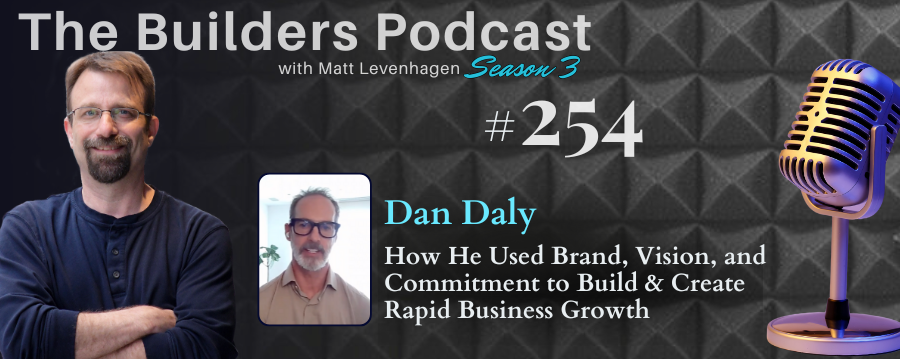
Description:
In an enlightening episode of The Builders podcast, Jeremy Shapiro dives deep into the intricacies of structuring and scaling a business. His insights into drawing up an effective organizational chart and identifying key roles underlying current business operations serve as the foundation for strategic growth.
From discussing the critical differences between working IN versus ON the business, to the significance of hiring and delegating effectively, this episode is a treasure trove for any entrepreneur looking to elevate their enterprise to the next level.
Jeremy emphasizes the vital role of documenting roles, responsibilities, and key performance indicators (KPIs) to enable not just delegation, but informed and focused team productivity. He also challenges common entrepreneur reservations such as the fear of losing control over quality, and the misconception that scaling requires exponential increases in team and resources.
Key Takeaways:
- Map out an organizational chart for your business as it stands today, identifying all the roles and responsibilities, not titles.
- Understand the difference between working on your business (strategic planning and vision) versus working in it (daily operations).
- The freedom gained by hiring others can increase your business's capacity, even if new hires aren't performing at the same level initially.
- Recognizing the importance of letting go of perfectionism can accelerate business progression and focus on value delivery.
- Identifying and leveraging the ‘superpowers’ or strengths within your team can lead to cross-pollination of skills and ideas, fostering growth and innovation.
Jeremy Shapiro

Jeremy B. Shapiro is a serial entrepreneur with a focus on software as a service (SaaS), technology, and information marketing.
In his role as a mentor and coach to entrepreneurs, Jeremy has helped small business owners make the transition from “solopreneur” to “business owner” – an important distinction that many entrepreneurs can easily miss when working “in” their business instead of “on” their business.
Since 1998, Jeremy has been helping entrepreneurs discover the core strengths in themselves and their business, and realize their true potential combining passion and expertise to grow their businesses and attain the freedom they deserve.
Through structured masterminding, one-on-one coaching, and consulting work, Jeremy is able to uncover hidden opportunities within individual businesses that provide the maximum profit for the business owner.
Jeremy has been interviewed extensively by the media for his expert opinions on the real estate market and business and has been interviewed and featured on NPR Morning Edition, the Boston Business Journal, Fox News, ABC, NBC, PBS, the Boston Globe, New England Cable News, The Australian, California Biz Journal, Market Watch, and was even interviewed by the Toyo Keizai – the Business Week of Japan.
When not helping other entrepreneurs take their businesses to the next level, you’ll likely find Jeremy traveling the world with his family, soaking up language and culture like a sponge, climbing mountains, cycling unreasonably long distances for fun, running, or playing in the kitchen.
THE MEAT OF IT!
- Introduction to Jeremy Shapiro
- Background as a serial entrepreneur
- Overview of Bay Area Mastermind
- Journey into Entrepreneurship
- Starting in high school
- Transitioning from building for others to self
- The Power of Mastermind Groups
- Definition and historical context
- Benefits of peer advisory and collective brainstorming
- Key Strategies for Business Scaling
- Importance of systems and processes
- Transitioning from technician to strategic owner
- Building an Effective Organizational Structure
- Mapping out current roles with org charts
- Planning for future growth and roles
- Empowered Teams: Hiring and Delegation
- Identifying key roles and responsibilities
- The role of delegation in team empowerment
- The Role of KPIs in Scaling
- Defining and documenting KPIs for each role
- Using KPIs to measure and encourage performance
- Overcoming Entrepreneurial Challenges
- Letting go of perfectionism
- Dealing with fears of losing control over quality
- Leveraging Team Strengths for Innovation
- Recognizing and using individual ‘superpowers'
- Cross-pollination of skills and ideas
- Achieving Entrepreneurial Freedom
- Balancing personal life with business demands
- The strategic importance of structured scalability
- Jeremy Shapiro’s Current Endeavors
- Running SaaS businesses
- Focus on coaching and community building
- Conclusion and Future Directions
- Final thoughts on strategic business scaling
- How to connect with Jeremy Shapiro for further insights
Click to See Episode Chapters and Timestamp
| Timestamp | Summary |
| 0:00:00 | Jeremy explains the first step in mapping out roles in a business. |
| 0:00:21 | Jeremy emphasizes the importance of including specific roles, not just titles, in the chart. |
| 0:01:09 | Jeremy explains that roles in the business may not be full-time and can be outsourced. |
| 0:01:39 | Matt introduces Jeremy as a guest on the show. |
| 0:02:07 | Jeremy explains his background as a serial entrepreneur and the concept of incubating ideas within existing businesses. |
| 0:03:02 | Matt asks Jeremy about the Bay Area mastermind and Jeremy explains the concept of a mastermind group. |
| 0:04:48 | Jeremy discusses the power of peer advisory in a mastermind group. |
| 0:05:12 | Matt asks Jeremy to share his origin story and how he got into entrepreneurship. |
| 0:06:19 | Jeremy talks about his passion for building and how he started his first businesses. |
| 0:07:11 | Jeremy explains his decision to leave college and focus on growing his business. |
| 0:08:14 | Jeremy discusses the influence of his family and the challenges of leaving school. |
| 0:09:19 | Matt and Jeremy discuss the risk-taking nature of entrepreneurs and the importance of seizing opportunities. |
| 0:10:47 | Jeremy shares his approach of starting businesses with paying customers from day one. |
| 0:11:26 | Matt asks Jeremy about his first sale and business experience |
| 0:11:54 | Jeremy recalls his first sale in high school, teaching computer skills |
| 0:13:09 | Jeremy discusses the importance of reducing time and increasing revenue |
| 0:14:35 | Matt raises the question of trading time for money and the desire for something bigger |
| 0:16:15 | Jeremy explains the difference between working in the business and owning the business |
| 0:17:44 | Jeremy gives an example of a subway franchisee and the benefits of being a business owner |
| 0:19:16 | Matt emphasizes the possibility of still being involved in the business while delegating tasks |
| 0:20:10 | Jeremy highlights the importance of enjoying the work and the difference between being an owner-operator and a business owner |
| 0:21:10 | Matt shares his experience of scaling his agency and hiring a project manager |
| 0:22:55 | Jeremy defines working in the business and working on the business |
| 0:23:03 | Work on the business vs work in the business |
| 0:24:25 | The importance of having the right systems and people in place |
| 0:25:15 | Stepping away from the business and the benefits of doing so |
| 0:26:49 | Creating a flexible lifestyle through systems and people |
| 0:28:39 | The challenge of hiring key roles and the importance of systems and people |
| 0:29:40 | Steps to prepare for freeing oneself from the business |
| 0:30:24 | Mapping out the roles and responsibilities in the business |
| 0:31:35 | Defining key result areas (KRAs) and key performance indicators (KPIs) |
| 0:33:31 | Ongoing monitoring of KPIs and structured communication with hires |
| 0:34:39 | The analogy of having the right person in the wrong seat |
| 0:34:37 | Sometimes the right person is in the wrong seat |
| 0:35:12 | Moving someone to a different role can be a mistake |
| 0:36:07 | Hiring someone to handle outbound calls increased productivity |
| 0:37:39 | Concerns about hiring someone: affordability and capability |
| 0:38:36 | Hiring people who are smarter than you can be beneficial |
| 0:39:33 | Even if someone can't do the job as well, it frees up your time |
| 0:41:57 | Perfectionist mindset can be detrimental to a business |
| 0:42:24 | Good copy can convert even without fancy graphics |
| 0:43:27 | Success can be achieved without fancy designs |
| 0:45:24 | The mastermind group requires an application process |
| 0:45:54 | Founders and entrepreneurs can invest in a test drive day |
| 0:46:17 | Qualification requirements for joining the group |
| 0:46:49 | Members have areas of expertise and share knowledge |
| 0:47:38 | Where to find more information about the Bay Area mastermind |
| 0:48:34 | Conclusion and farewell |
| 0:48:37 | Sponsor message from Unified Web Design |
| 0:49:16 | Closing remarks |

Check out these related Episodes:
- Episode 165: Kristin Zhivago – Building Success on Kindness, Promises, and a Jerk-Free Culture
- Episode 161: Jeannette Seibly – The Hiring Triangle: Assessments, Interviews, and Due Diligence
- Episode 159: Mark Graban – Transforming Mistakes into Positive Outcomes & Continuous Improvement




